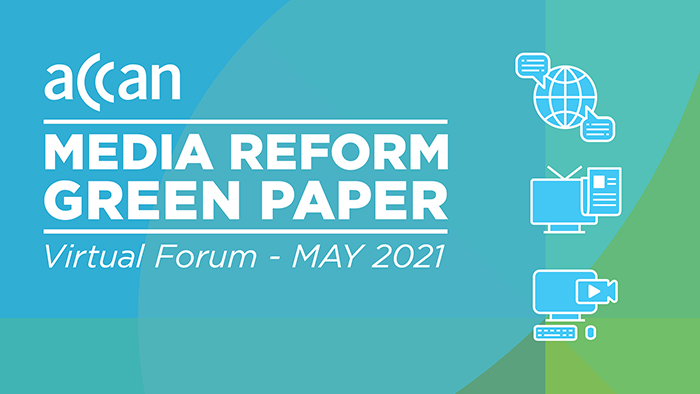Our focus
- Details
- News
 Struggling with the cost of your internet or phone service? ACCAN has put together a list of telco offers to help targeted groups stay connected.
Struggling with the cost of your internet or phone service? ACCAN has put together a list of telco offers to help targeted groups stay connected.
As this list only shows offers for targeted groups, there may be alternative products and services out there for general consumers that meet your needs, so it’s also worth comparing plans. To do so, head to an online comparison site, such as WhistleOut or Finder. ACCAN has also prepared a money saving guide with tips to reduce your telco bill.
If you are unable to meet your bills and are in financial hardship, check out ACCAN’s hardship portal for more information on what you can do.
Read more: What programs and offers are available to help you stay connected?
Write comment (5 Comments)- Details
- News

When disaster strikes, you want to be able to call for help. As Australia makes the switch to the NBN, it’s important to know that traditional methods of connecting to emergency services may not work.
In the event of a power outage, phone and internet services provided over the NBN network will not work. This will also affect any medical alarms or security alarms that you may have which connect through the NBN.
Read more: Staying connected during emergencies
Write comment (0 Comments)- Details
- News
What media reforms are proposed in the Green Paper?
Spectrum reform
The key reform proposal relates to technical changes in the way broadcasting content might be delivered. Australian broadcast television is delivered using ‘spectrum’, and there is only a finite amount of spectrum available. Currently, all of the available spectrum is being used for free-to-air television broadcasting.
However, new digital broadcasting technology means less spectrum can now be used to deliver the same broadcasting services. The Government would like television broadcasters to work together to use less spectrum because:
- If enough broadcasters agree to broadcast on less spectrum, there will be more free spectrum available to be used for other purposes. One of these potential purposes is to reallocate that spectrum to improve telecommunications networks in currently underserviced areas.
- Because the amount of spectrum available is finite, it is a valuable asset. The Government could auction off this spectrum for a profit, which it says could then be re-invested. A fund could be established to support more regional news and more Australian drama, documentary and children’s content.
- For example, the profit could be invested in more local news services in regional, rural and remote areas of Australia, and/or local television and film content production. The Green Paper doesn’t specify how much of the profit would be invested in local and regional news, or Australian content production.
Read more: Background to the Media Reform Green Paper
Write comment (0 Comments)- Details
- News
Background

In March 2018 it was revealed that the data firm, Cambridge Analytica, gained unauthorised access to almost 87 million (primarily United States) Facebook users’ data. Also implicated was Cambridge Analytica’s British counterpart, Strategic Communication Laboratories.
Facebook users’ data was harvested through the two data firms through a personality-quiz app created by Cambridge psychology professor, Aleksandr Kogan, named “This Is Your Digital Life”. Facebook confirmed that only 270,000 Facebook users downloaded Kogan’s app, but Facebook has not yet refuted claims that up to 87 million users’ data had been accessed. During this time, when Facebook users downloaded apps connected to their Facebook accounts, they also exposed data from many of their friends to the app developer, hence, the large estimated number of users affected.
Read more: Cambridge Analytica and Facebook: The Aftermath
Write comment (0 Comments)- Details
- News
 Over the last ten years, faster internet speeds have dramatically impacted the way that Australians consume media. Many Australians have switched from free-to-air television (FTA) to subscription video on demand services. These include streaming services like Netflix, Stan, and Kayo and broadcast video on demand (FTA catch-up services, or BVOD). According to the ACMA, 77% of Australian households now have at least one SVOD service, compared to 61% in 20171.
Over the last ten years, faster internet speeds have dramatically impacted the way that Australians consume media. Many Australians have switched from free-to-air television (FTA) to subscription video on demand services. These include streaming services like Netflix, Stan, and Kayo and broadcast video on demand (FTA catch-up services, or BVOD). According to the ACMA, 77% of Australian households now have at least one SVOD service, compared to 61% in 20171.
With viewers switching from free-to-air to online content, there have been many questions raised about how the traditional media industry can sustain itself in a world where advertising dollars follow audiences; with less people tuning in to traditional media, these outlets are less attractive to advertisers. Regional newspapers and television channels are also closing because of loss of advertising revenue. To help keep Australia’s media sector alive, the Government needs to find a way to modernise television regulation.
With the expansion in dependency on data services and roll-out of 5G Mobile, the government is also looking at how they manage the limited spectrum used for telecommunications and broadcasting.
To encourage input and debate from interested parties about how the media laws should be changed, the Government released a Green Paper in November 2020 with proposals for new ways to fund Australian media and how it operates.
Read more: Media Reform Green Paper – Modernising Television Regulation in Australia
Write comment (0 Comments)- Details
- News
 As we head into the festive season, many of us will be thinking about what new gadget we’d like to find under the Christmas tree or snap up in the Boxing Day sales. With the telcos stepping up their advertising around 5G, many people have started to look into purchasing 5G phones and home broadband plans. If you’re keen to be one of these early-adopters, don’t sign on the dotted line before you’ve read our tips below.
As we head into the festive season, many of us will be thinking about what new gadget we’d like to find under the Christmas tree or snap up in the Boxing Day sales. With the telcos stepping up their advertising around 5G, many people have started to look into purchasing 5G phones and home broadband plans. If you’re keen to be one of these early-adopters, don’t sign on the dotted line before you’ve read our tips below.
Read more: Christmas wrap-up: 5G phones
Write comment (1 Comment)- Details
- News
 ACCAN welcomes the Government’s recent announcement that it will provide a total of $4 Million in funding to the national broadcasters, ABC and SBS, to introduce audio described broadcast content in the 2020/21 financial year. ACCAN, along with Australia’s blindness sector and consumer groups have been advocating for the introduction of audio description across free-to-air television for many years.
ACCAN welcomes the Government’s recent announcement that it will provide a total of $4 Million in funding to the national broadcasters, ABC and SBS, to introduce audio described broadcast content in the 2020/21 financial year. ACCAN, along with Australia’s blindness sector and consumer groups have been advocating for the introduction of audio description across free-to-air television for many years.
Audio description is a verbal narration of visual elements of programming. The narration coincides with the program’s audio track with the description interspersed between dialogue.
Read more: ACCAN welcomes Government's Audio Description funding
Write comment (1 Comment)- Details
- News
ACCAN CEO Teresa Corbin recently spoke at the CommsDay Congress, a telecommunications industry event attended by regulators, consumer groups, telco executives and government representatives. Ms Corbin spoke about ACCAN's work highlighting the need for affordable broadband, the importance of Accessible Telecoms, and why we need reliable telecommunications services.
Her speech is available below.
Read more: ACCAN CEO addresses CommsDay Congress
Write comment (0 Comments)- Details
- News
ACCAN is seeking nominations for Directors to fill three (3) vacancies on its Board.
In accordance with the ACCAN Constitution, the 2019-2020 ACCAN Board will consist of nine (9) members1. Six (6) positions are continuing Directors from the 2018-2019 Board. Three (3) Directors are retiring from the Board but may be eligible for re-election as stated in the ACCAN Constitution.
In accordance with the ACCAN Constitution Board members are elected for a three year term.
In order to ensure an appropriate balance, the Board is particularly seeking candidates with legal and regulatory expertise or experience; and/or experience in financial management and governance in a not for profit organisation; and/or with lived experience of disability; and/or an understanding of the issues affecting young consumers and/or small businesses.
Read more: Call for nominations for the ACCAN Board
Write comment (0 Comments)- Details
- News
The Government has contracted ACCAN to research the ways in which people who are Deaf, Deafblind, or have hearing or speech impairment use the new Accesshub website.
Accesshub is a telecommunications information website provided by the Australian Government. Accesshub provides a range of information resources about how to use the National Relay Service (NRS) as well as information about mainstream communications equipment and services which may be suitable alternatives to the national relay service for some people.
The focus groups will be held in Sydney, Melbourne and Hobart with people who use the NRS and have used Accesshub. We are interested in how you currently use the Accesshub website, what you think about it, and how it could be improved. Participants will receive a $100 gift card to thank them for participating in the project. Light refreshments will also be provided.
Read more: Accesshub Focus Groups
Write comment (0 Comments)- Details
- News

The NBN provides the wires that deliver broadband and fixed phone services to your home. Your telco pays the NBN owner, nbn co, to use the NBN and sell you broadband. This means that the service that you get from your telco is directly related to the service that nbn co gives telcos. This includes how long it takes to connect broadband customers, whether appointments with technicians are kept, the number and length of outages you may experience, or the speed of your broadband at different times of day.
Read more: NBN Wholesale Service Standards – What the ACCC Inquiry Means For You
Write comment (0 Comments)- Details
- News

Telstra is once again making changes to its mobile phone plans. If you are an existing Telstra mobile customer, this may impact you.
From 26 August 2019, Telstra will be moving hundreds of thousands of customers off their old mobile phone plans and onto one of Telstra’s new plans.
Starting this week, Telstra is contacting customers who will be affected by this move. It’s important that you keep an eye out on your email inbox or letter box so that you know if you are one of the hundreds of thousands of customers who will be impacted by these changes.
Read more: Telstra phone plan changes
Write comment (5 Comments)